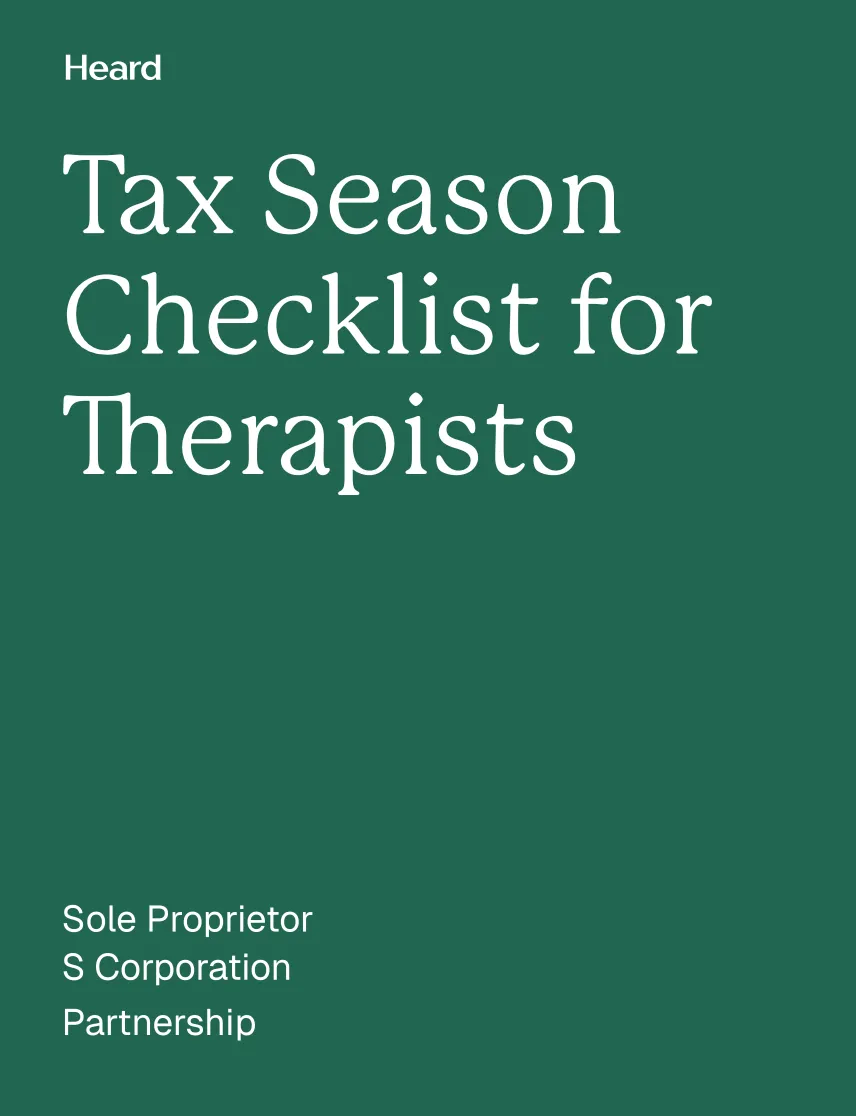The government shutdown is already beginning to affect some therapists. In particular, if you’re preparing your therapy practice for tax season, you could see an impact on your tax filing and on any potential refunds.
Starting October 8th, 2025, the IRS put approximately half of its workforce on furlough. Some of the most significant reductions occurred in the Small Business/Self-Employed (SB/SE) division.
While essential functions like online filing remain in operation, other IRS services may be slowed down or even frozen. And, depending on how long the shutdown lasts, the IRS furloughs could have effects that extend into tax season.
Here’s what you need to know.
IRS filing and payment deadlines still apply
Deadlines for filing and paying your taxes have not changed. That includes deadlines for:
- Quarterly estimated payments (September 15th, 2025 for Q3 and January 15th, 2026 for Q4).
- Individual and sole proprietor returns (April 15th, 2026)
- Individual and sole proprietor extension requests (April 15th, 2026)
- S corp filing (March 16th, 2026)
- S corp extension returns (March 16th, 2026)
- Individual filing for 2024 with an extension (October 15th, 2025)
- S corp filing for 2024 with an extension (September 15th, 2025)
If you have employees, your schedule for remitting payroll and income tax remains the same.
If you have already missed a tax deadline, you should file as soon as possible to avoid penalties. Interest on late payments and filings will continue to apply regardless of the government shutdown.
And if you’ve fallen behind on bookkeeping and you’re not sure whether you will be able to file your 2025 taxes on time, you should catch up as soon as possible and, if necessary, file for an extension.
For now, it’s safe to assume that filing deadlines will not be impacted by the shutdown.
{{resource}}
Tax assistance and complex cases may be delayed
If you’re relying on IRS assistance for support due to financial hardship, or for help resolving procedural issues, you should expect delays. The National Taxpayer’s Advocate office has reduced its operations.
The US Tax Court has also paused most proceedings, so if you were anticipating a resolution in court, you should also expect delay.
IRS personal support is limited
For the duration of the shutdown, IRS phone support is operating with minimal staff. Although automated phone systems are still operational, you will likely be unable to speak to an IRS representative.
Also, the IRS is not currently responding to correspondence. However, any forms or payments you submit by mail will continue to be received and processed.
If you are currently in correspondence with the IRS—for instance, due to an audit—you must ensure you respond to any requests for information in a timely manner. Keep mail slips confirming when you sent correspondence so you can prove you submitted them on time.
The tax season situation is still developing
While for the most part IRS business is proceeding as normal, the current furlough situation could impact tax season.
Forms, filings, and correspondence could form backlogs of work that will take the IRS extra time to clear. That could result in delayed processing for tax returns, delayed refunds, and challenges contacting the IRS during tax season.
The government shutdown is a developing situation. Depending on how long it lasts, it could have more wide-ranging effects on the IRS and on tax filing for your therapy practice.
In the meantime, you can track the situation via the IRS tax updates page.
How to prepare for tax season with a government shutdown
While it’s impossible to say exactly what impact the government shutdown will have on tax season for your therapy practice, there are steps you can take to prepare:
- File accurately and on time. IRS deadlines, and penalties and interest on late filing and payments, continue to apply. Stay on top of your financial back office and, if necessary, catch up with your bookkeeping so you can file an accurate, timely return.
- Avoid overpaying if possible. Reassess your income projections for 2025 and, if necessary, adjust your Q4 quarterly payment to avoid overpaying your taxes. Since refunds may be delayed, paying as accurately as possible can help you avoid tying up funds in the form of a pending refund. (As always, keep the safe harbor rule in mind.)
- Don’t count on a timely tax refund. If you are budgeting for a sizable tax refund in 2026, now may be a good time to adjust your budget. With tax refunds potentially delayed, a timely refund is not a sure bet.
- Consider delaying complex tax moves. If the government shutdown and IRS staffing shortages continue, there is potential for more complex procedures—like electing S corp status or modifying past returns—to be delayed. Consult with an accountant before making any business-critical decisions.
- Keep up with remittances and quarterly payments. Payroll remittance schedules and the deadlines for quarterly payments have not changed. Avoid the temptation to let things slip. Keeping up to date with all your filings and payments is the best insurance against complications when tax season arrives.
This post is to be used for informational purposes only and does not constitute legal, business, or tax advice. Each person should consult their own attorney, business advisor, or tax advisor with respect to matters referenced in this post.
Bryce Warnes is a West Coast writer specializing in small business finances.
{{cta}}
Manage your bookkeeping, taxes, and payroll—all in one place.

Discover more. Get our newsletter.
Get free articles, guides, and tools developed by our experts to help you understand and manage your private practice finances.





